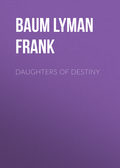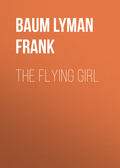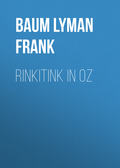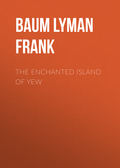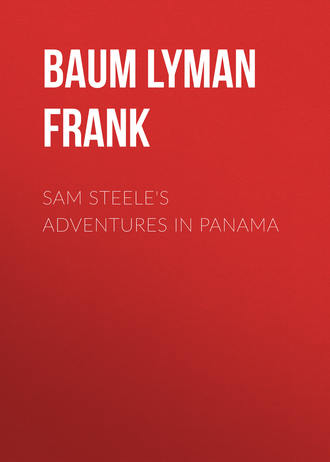
Лаймен Фрэнк Баум
Sam Steele's Adventures in Panama
CHAPTER I
I UNDERTAKE A HAZARDOUS VOYAGE
The bark Nebuchadnezar came staggering into Chelsea harbor in a very demoralized condition. Her main and mizzen masts were both gone, the bulwarks were smashed in, the poop swept away, and she leaked so badly that all the short-handed crew were nearly ready to drop from the exhausting labor of working the pumps. For after weathering a dreadful storm in which the captain and mate were washed overboard, together with five of the men, those remaining had been forced to rig up a square-sail on the foremast and by hook or crook to work the dismantled hulk into harbor, and this they did from no love of the ship but as a matter of mere self-preservation, the small boats having all been lost or destroyed.
As soon as they dropped anchor in the harbor they fled from the crippled ship and left her to her fate.
It fortunately happened that an agent of the owners, a man named Harlan, lived at Chelsea and was able to take prompt action to save the company’s property. The Nebuchadnezar was loaded heavily with structural steel work from Birmingham, which had been destined for San Pedro, California, which is the port of entry for the important city of Los Angeles. It was a valuable cargo, and one well worth saving; so Mr. Harlan quickly sent a lot of men aboard to calk the sprung seams and pump her dry, and within twenty-four hours they had her safe from sinking, although she still looked more like a splintered tub than a ship.
And now the agent spent a whole day exchanging telegrams with the chief agents of the Line in New York. It appeared that to unload the heavy structural beams, which were of solid steel, and ship them by rail across the continent would entail a serious loss, the freight rates being enormous for such a distance. There was at the time no other ship procurable to carry the cargo on to its destination. Either the old Nebuchadnezar must be made seaworthy again, and sent on its way around the Horn to San Pedro, or the company was in for a tremendous loss.
Harlan was a man of resource and energy. He promptly informed his superiors that he would undertake to fit the ship for sea, and speedily; so he was given permission to “go ahead.”
New masts were stepped, the damages repaired, and the bark put in as good condition as possible. But even then it was a sad parody on a ship, and the chances of its ever getting to the port of destination were regarded by all observers as extremely doubtful.
Having done the best in his power, however, Mr. Harlan came to my father and said:
“Captain Steele, I want you to take the Nebuchadnezar to San Pedro.”
The Captain smiled, and answered with his usual deliberation:
“Thank you, Mr. Harlan; but I can’t by any possibility get away this winter.”
You see, we were just building our new vessel, the Seagull, which was to be our future pride and joy, and my father did not believe the work could progress properly unless he personally inspected every timber and spike that went into her. Just now the builders were getting along finely and during the coming winter all the interior fittings were to be put in. I knew very well that nothing could induce Captain Steele to leave the Seagull at this fascinating period of its construction.
Mr. Harlan was very grave and anxious, and spoke frankly of the difficulty he was in.
“You see, sir, my reputation is at stake in this venture,” he explained, “and if anything happens to that cargo they will blame me for it. The only way to avoid a heavy loss is to get the old hull into port, and I am aware that to accomplish this task a man of experience and exceptional judgment is required. There is not another captain on the coast that I would so completely and confidently trust with this undertaking as I would you, sir; and we can afford to pay well for the voyage.”
My father appreciated the compliment, but it did not alter his resolve.
“Can’t be done, Mr. Harlan,” he said, pressing the ashes into the bowl of his pipe and looking around the group of intent listeners with a thoughtful expression. “Time was when I’d have liked a job of that sort, because it’s exciting to fight a strong ocean with a weak ship. But my whole heart is in the Seagull, and I can’t an’ won’t leave her.”
Just then his eyes fell upon me and brightened.
“There’s no reason, howsomever,” he added, “why Sam can’t undertake your commission. We won’t be likely to need him this winter, at all.”
Mr. Harlan frowned; then looked toward me curiously.
“Would you really recommend a boy like Sam for such an important undertaking?” he asked.
“Why not, sir?” replied my father. “Sam’s as good a navigator as I am, an’ he’s a brave lad an’ cool-headed, as has been proved. All he lacks is experience in working a ship; but he can take my own mate, Ned Britton, along, and there’s not a better sailing-master to be had on the two oceans.”
The agent began to look interested. He revolved the matter in his mind for a time and then turned to me and asked, abruptly:
“Would you go, sir?”
I had been thinking, too, for the proposition had come with startling suddenness.
“On one condition,” said I.
“What is that?”
“That in case of accident – if, in spite of all our efforts, the old tub goes to the bottom – you will hold me blameless and look as cheerful as possible.”
The agent thought that over for what seemed a long time, considering the fact that he was a man of quick judgment and action. But I will acknowledge it was a grave condition I had required, and the man knew even better than I did that under the most favorable circumstances the result of the voyage was more than doubtful. Finally he nodded.
“I do not know of any one I would rather trust,” said he. “You are only a boy, Sam Steele; but I’ve got your record, and I know Ned Britton. Next to getting Captain Steele himself, the combination is as good as I could hope to secure for my company, and I’m going to close with you at once, condition and all.”
Britton, who was himself present at this conference, shifted uneasily in his chair.
“I ain’t right sure as we can ship a proper crew, sir,” he remarked, eyeing me with the characteristic stare of his round, light blue eyes, which were as unreadable as a bit of glass.
“Well, we can try, Ned,” I answered, with some concern. “I shall take Nux and Bryonia along, of course, and we won’t need over a dozen able seamen.”
I must explain that the Nux and Bryonia mentioned were not homeopathic remedies, but two stout, black South Sea Islanders who bore those absurd names and had already proven their loyalty and devotion to me, although they were the especial retainers of my uncle, Naboth Perkins.
“What became of the crew that brought the ship in?” asked my father.
“Deserted, sir, an’ dug out quick’s scat,” answered Ned.
“Why?”
“Said as nothing but bad luck followed the ship. She were a thirteener, sir, and bound fer to get in trouble.”
“How’s that?”
“Why, I talked with the second mate, who brung the ship in. He said they had sailed from Liverpool on a Friday, the thirteenth o’ the month. There was thirteen aboard; it were the Cap’n’s thirteenth voyage; an’ the Nebuchadnezar, which had thirteen letters in its name – bein’ as how it were mis-spelled by its builders – was thirteen year old to a day. That was bad enough fer a starter, as everybody can guess. Thirteen days out they struck trouble, an’ it clung to ’em as desp’rit as their own barnacles. You couldn’t hire one o’ that crew to go aboard agin, sir, fer love or money.”
This dismal revelation struck a chill to all present, except, perhaps, Mr. Harlan and myself. I am superstitious about some things, I acknowledge, but thirteen has for me always been a number luckier than otherwise. However, I knew very well that sailors are obstinate and fearful; so I turned to the agent and said:
“You must paint out that name Nebuchadnezar and replace it with any other you like. Do it at once, before we attempt to ship a crew. With that accomplished, Ned won’t have much trouble in getting the men he wants.”
“I’ll do it,” replied Mr. Harlan, promptly. “I’ll call her the Gladys H., after my own little daughter. That ought to bring her good luck.”
Ned bobbed his head approvingly. It was evident the idea pleased him and removed his most serious objection to the voyage.
“And now,” continued the agent, “it is only necessary to discuss terms.”
These proved liberal enough, although I must say the money was no factor in deciding me to undertake the voyage. I had been quite fortunate in accumulating a fair share of worldly wealth, and a part of my own snug fortune had gone into our new Seagull, of which I was to be one-third owner.
So it was really a desire to be doing something and an irrepressible spirit of adventure that urged me on; for, as my father said, a struggle with old ocean was always full of surprises, and when we had such frail support as the crippled Nebuchadnezar, the fight was liable to prove interesting.
But that preposterous name was painted out the following day, and before I trod the deck for the first time the bark had been renamed the Gladys H., and was resplendent in fresh paint and new cordage. The old hulk actually looked seaworthy to a superficial observer; but Ned Britton went below and examined her seams carefully and came back shaking his head.
“If the weather holds good and the cargo steady,” he said to me, “we may pull through; but if them big iron beams in the hold ever shifts their position, the whole hull’ll open like a sieve.”
“Don’t whisper that, Ned,” I cautioned him. “We’ve got to take chances.”
He was not the man to recoil at taking chances, so he kept a close mouth and in three days secured all the sailors we needed.
They were a fairly good lot, all experienced and steady, and when I looked them over I was well pleased. One or two who were new to our parts grinned rather disrespectfully when they noted my size and youth; but I paid little attention to that. I was, in reality, a mere boy, and the only wonder is that they consented to sail under my command.
My mate, however, looked every inch the sailor, and won their immediate respect, while my father’s ample reputation as a daring and skillful captain caused the men to be lenient in their judgment of his son.
It was to be a long cruise, for Mr. Harlan had instructed me to skirt the coast all the way to Cape Horn, keeping well in to land so that in an emergency I could run the ship ashore and beach her. That would allow us to save the valuable cargo, even if we lost the ship, and that structural steel work was worth a lot of bother, he assured me.
“When you get to the Cape,” said the agent, “take your time and wait for good weather to round it. There’s no hurry, and by the time you arrive there the conditions ought to be the most favorable of the year. Once in the Pacific, continue to hug the coast up to San Pedro, and then telegraph me for further instructions. Of course you know the consignment is to the contracting firm of Wright & Landers, and when you arrive they will attend to the unloading.”
I got my things aboard and found my room very pleasant and of ample size. I took quite a library of books along, for the voyage would surely consume most of the winter. We were liberally provisioned, for the same reason, and our supplies were of excellent quality.
My two black Islanders, Nux and Bryonia, were calmly indifferent to everything except the fact that “Mars’ Sam” was going somewhere and would take them along.
Bry was our cook, and a mighty good one, too. With him in charge of the galley we were sure to enjoy our meals. Nux acted as steward and looked after the officers’ cabins. He was wonderfully active and a tower of strength in time of need. Both men I knew I could depend upon at all times, for they were intelligent, active, and would be faithful to the last.
We arranged to sail with the tide on a Wednesday afternoon, the date being the nineteenth of September. On that eventful morning every preparation was reported complete, and I rowed to the shore for a final conference with the agent and a last farewell to my father.
CHAPTER II
I SHIP A QUEER PASSENGER
The ship-yards were on this side of the harbor, and presented a busy scene; for besides our own beautiful Seagull, whose hull was now nearly complete and so graceful in its lines that it attracted the wondering admiration of every beholder, several other ships were then in the yards in course of construction.
It was in one of the builders’ offices that I met my father and Mr. Harlan, and while we were talking a man came in and touched his cap to us, saying:
“May I speak to Captain Steele?”
He was about thirty years of age, somewhat thin and lank in appearance, and would have been considered tall had he stood erect instead of stooping at the shoulders. His face was fine and sensitive in expression and his eyes were large and gray but dreamy rather than alert. Gray eyes are usually shrewd; I do not remember ever before seeing so abstracted and visionary a look except in brown or black ones. The man’s hair was thick and long and of a light brown – nearly “sandy” – color. He dressed well but carelessly, and was evidently nervous and in a state of suppressed excitement when he accosted us. I noticed that his hands were large and toil-worn, and he clasped and unclasped them constantly as he looked from one to another of our group.
“I am Captain Steele,” said my father.
“Then, sir, I desire to ask a favor,” was the reply.
“State it, my man.”
“I want you to take me and my automobile with you on your voyage to Los Angeles.”
Mr. Harlan laughed, and I could not repress a smile myself.
“Then I’m not the Captain Steele you want,” said my father. “This is the one you must deal with,” pointing his finger in my direction.
The stranger turned, but to my satisfaction seemed in no way surprised or embarrassed by being confronted with a boy.
“It will be a great favor, sir,” he continued, earnestly. “I beg you will grant my request.”
“An automobile!” I exclaimed.
“Yes, sir.”
“Your request is unusual,” I said, in order to decline gracefully, for something about the fellow was strangely appealing. “We are not a passenger ship, but a slow freighter, and we are bound for a long voyage around the Horn.”
“Time does not greatly matter,” he murmured. “Only one thing really matters at all.”
“And that?”
“The expense.”
We stared at him, somewhat perplexed.
“Permit me to explain,” he went on, still gazing at me alone with his beseeching eyes. “I have invented an automobile – not strictly an automobile, it is true; but for want of a better name I will call it that. I have been years experimenting and building it, for it is all the work of my own hands and the child of my exclusive brain. It is now just finished – complete in every part – but I find that I have exhausted nearly every available dollar of my money. In other words, sir, my machine has bankrupted me.”
He paused, and catching a wink from Mr. Harlan I said in an amused tone:
“That is an old story, sir.”
“You doubt it?”
“No; I mean that it is quite natural.”
“Perhaps,” he replied. “You see I had not thought of money; merely of success. But now that at last I have succeeded, I find that I have need of money. My only relative is a rich uncle living at Pasadena, California, who is so eccentric in his disposition that were I to appeal to him for money he would promptly refuse.”
“Most rich men have that same eccentricity,” I observed.
“But he is quite a genius commercially, and if he saw my machine I am confident he would freely furnish the money I require to erect a manufactory and promote its sale. I assure you, gentlemen,” looking vaguely around, “that my machine is remarkable, and an original invention.”
We nodded. There was no object in disputing such a modest statement.
“So I wish to get myself and my automobile to Los Angeles, and at the least possible expense. The railroads demand a large sum for freight and fare, and I have not so much money to pay. By accident I learned that your ship is going to the very port I long to reach, and so I hastened to appeal to you to take me. I have only two hundred dollars in my possession – the last, I grieve to say, of my ample inheritance. If you will carry us for that sum to your destination, I shall indeed be grateful for the kindness.”
Really, I began to feel sorry for the poor fellow.
“But,” said I, “I cannot possibly take you. We sail this afternoon and the hatches are all closed and battened down for the voyage.”
“I do not wish the machine put in the hold,” he answered, with strange eagerness. “All I ask is a spot in which to place it on the deck – anywhere that will be out of your way. I will make it secure, myself, and take every care of it, so that it will cause you no trouble at all.”
“I’m afraid you could not get it to the ship in time.”
“It is already loaded upon a flat-boat, which will take it to the Gladys H. in an hour, once I have your permission.”
I looked at him in astonishment.
“You seem to have considered your request granted in advance,” I remarked, with some asperity.
“Not that, sir; I am not impertinent, believe me. But I enquired about Captain Steele and was told that he is a good man and kind. So, that I might lose no time if I obtained your consent, I had the machine loaded on the flat-boat.”
Mr. Harlan laughed outright. Acting upon a sudden impulse I turned to him and said:
“May I decide as I please in this matter?”
“Of course, Sam,” he replied. “It is your affair, not mine.”
I looked at the stranger again. He was actually trembling with anxious uncertainty.
“Very well,” I announced, “I will take you.”
“For the two hundred dollars?”
“No; I’ll carry you for nothing. You may need that extra money at your journey’s end.”
He took out his handkerchief and wiped his brow, upon which beads of perspiration were standing.
“Thank you, sir,” he said, simply.
“But I must warn you of one thing. The bark is not in what we call A-1 condition. If she happens to go to the bottom instead of San Pedro I won’t be responsible for your precious machine.”
“Very well, sir. I will take as many chances as you do.”
“May I ask your name?”
“Moit, sir; Duncan Moit.”
“Scotch?”
“By ancestry, Captain. American by birth.”
“All right; make haste and get your traps aboard as soon as possible.”
“I will. Thank you, Captain Steele.”
He put on his cap and walked hurriedly away, and when he had gone both Mr. Harlan and my father rallied me on account of my queer “passenger.”
“He looks to me like a crank, Sam,” said the agent. “But it’s your fireworks, not mine.”
“Whatever induced you to take him?” Captain Steele enquired, wonderingly.
“The bare fact that he was so anxious to go,” I replied. “He may be a crank on the automobile question, and certainly it is laughable to think of shipping a machine to Los Angeles on a freighter, around the Horn; but the poor fellow seemed to be a gentleman, and he’s hard up. It appeared to me no more than a Christian act to help him out of his trouble.”
“You may be helping him into trouble, if that confounded cargo of yours takes a notion to shift,” observed my father, with a shake of his grizzled head.
“But it’s not going to shift, sir,” I declared, firmly. “I’m looking for good luck on this voyage, and the chances are I’ll find it.”
The agent slapped me on the shoulder approvingly.
“That’s the way to talk!” he cried. “I’m morally certain, Sam, that you’ll land that cargo at San Pedro in safety. I’m banking on you, anyhow, young man.”
I thanked him for his confidence, and having bade a last good-bye to my father and my employer I walked away with good courage and made toward my boat, which was waiting for me.
Uncle Naboth was waiting, too, for I found his chubby form squatting on the gunwale.
Uncle Naboth’s other name was Mr. Perkins, and he was an important member of the firm of “Steele, Perkins & Steele,” being my dead mother’s only brother and my own staunch friend. I had thought my uncle in New York until now, and had written him a letter of farewell to his address in that city that very morning.
But here he was, smiling serenely at me as I approached.
“What’s this foolishness I hear, Sam?” he demanded, when I had shaken his hand warmly.
“I’m off on a trip around the Horn,” said I, “to carry a cargo of building steel to the Pacific coast in that crippled old bark, yonder.”
His sharp eye followed mine and rested on the ship.
“Anything in it, my lad?”
“Not much except adventure, Uncle. But it will keep me from growing musty until Spring comes and the Seagull is ready for launching. I’m dead tired of loafing around.”
He began to chuckle and cough and choke, but finally controlled himself sufficiently to gasp:
“So’m I, Sam!”
“You?”
“Tired as blazes. New York’s a frost, Sam. Nothin’ doin’ there that’s worth mentionin’. All smug-faced men an’ painted-faced women. No sassiety, more policemen than there is sailors, hair-cuts thirty-five cents an’ two five-cent drinks fer a quarter. I feel like Alladin an’ the Forty Thieves – me bein’ Alladin.”
“But, Uncle, it wasn’t Aladdin that the Forty – ”
“Never mind that. Got a spare bunk aboard, Sam?”
I laughed; but there was no use in being surprised at anything Uncle Naboth did.
“I’ve got a whole empty cabin – second mate’s.”
“All right. When do we sail?”
“Three o’clock, Uncle Naboth – sharp.”
“Very good.”
He turned and ambled away toward the town, and, rather thoughtfully, I entered my boat and was rowed out to the Gladys H.



